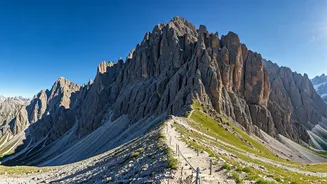Pre-Trek Preparations Matter
This section emphasizes the importance of planning and preparation before a mountain trek. It includes route research, informing someone about your itinerary,
packing essentials, assessing fitness levels, acclimatization to altitude, and obtaining necessary permits. Proper preparation can significantly reduce risks and enhance your safety on the trail.
Recognize Environmental Hazards
This section covers the recognition of environmental hazards during mountain treks. It includes understanding weather changes, identifying unstable terrain, recognizing avalanche risks, awareness of wildlife encounters, river crossing safety, altitude sickness knowledge, and first aid preparedness. Being proactive in identifying these risks can greatly reduce the potential for accidents.
Navigation & Staying Found
This section focuses on the navigational aspects of mountain trekking. It covers the importance of maps and compasses, regular position checks, using GPS devices with offline maps, understanding trails, identifying landmarks, and what to do if you get lost. Competent navigation is essential for ensuring you remain on track and can find your way back if conditions worsen.
Emergency Preparedness & Response
This section outlines critical emergency preparedness and response strategies for mountain treks. It includes carrying a comprehensive first aid kit, acquiring basic first aid skills, understanding how to treat hypothermia and frostbite, carrying communication devices, and having contact information for emergency services. Knowing how to act in an emergency greatly increases the chances of a positive outcome.
Teamwork and Group Dynamics
This section focuses on teamwork and group dynamics while trekking in the mountains. It covers the importance of clear communication, designated leadership, regular member checks, offering support, fostering teamwork, sharing responsibilities, and recognizing individual strengths. A well-coordinated team substantially increases safety and effectiveness in the mountains.
Leave No Trace Principles
This section emphasizes the importance of Leave No Trace principles when trekking. It details packing out trash, minimizing campfire impacts, avoiding damage to vegetation and wildlife habitats, respecting wildlife, staying on trails, disposing of waste properly, and choosing durable gear. Following these practices helps conserve the natural environment and minimizes your impact on the mountains.























